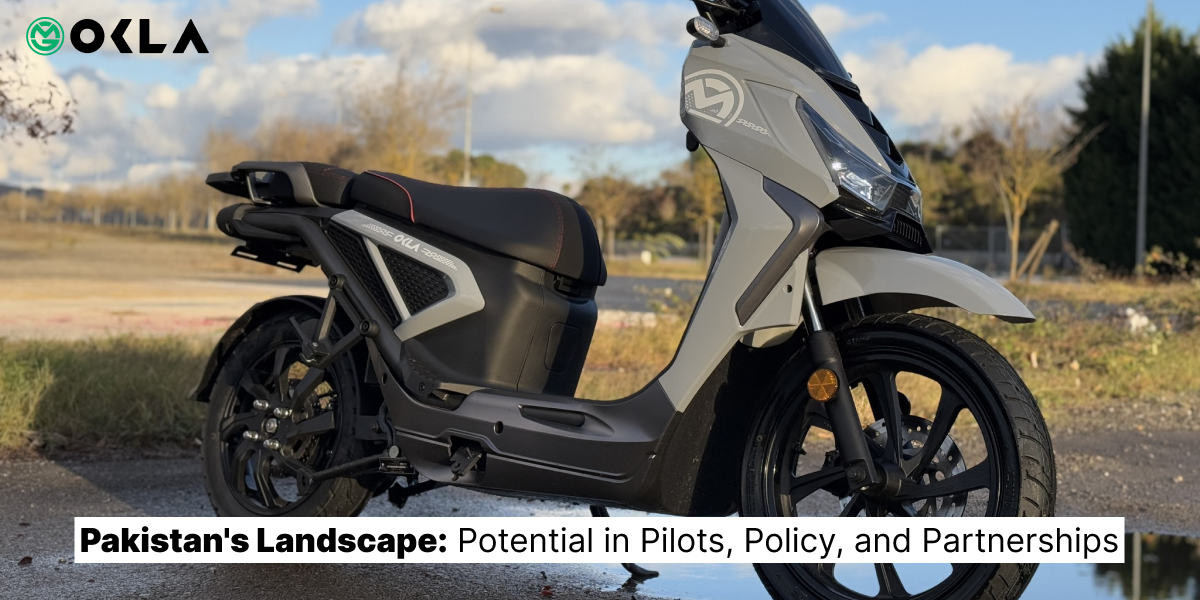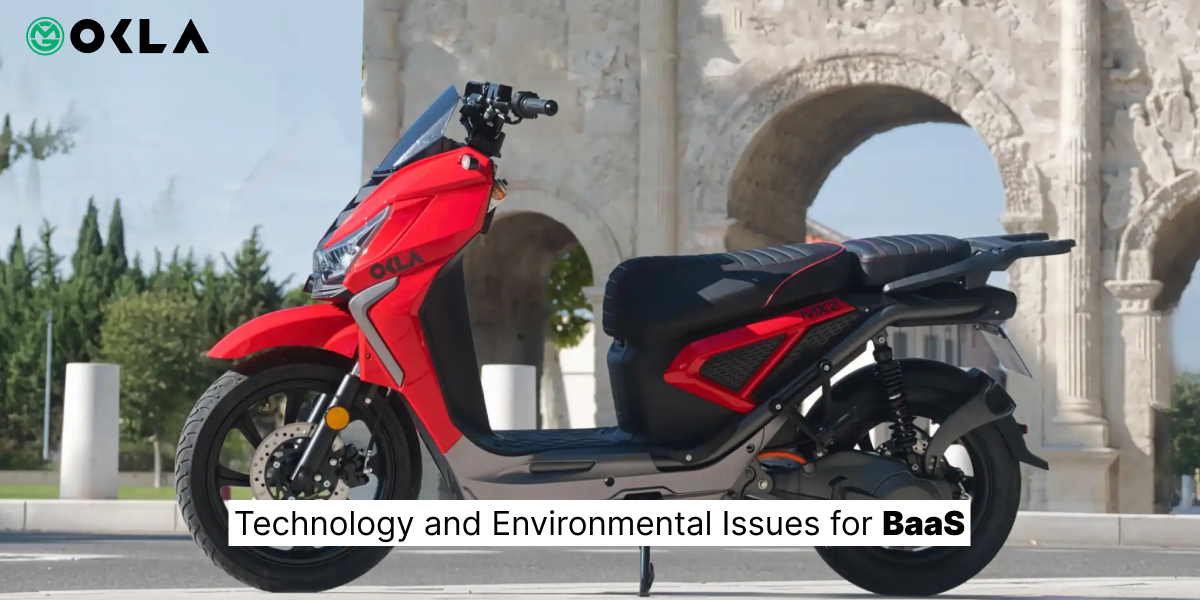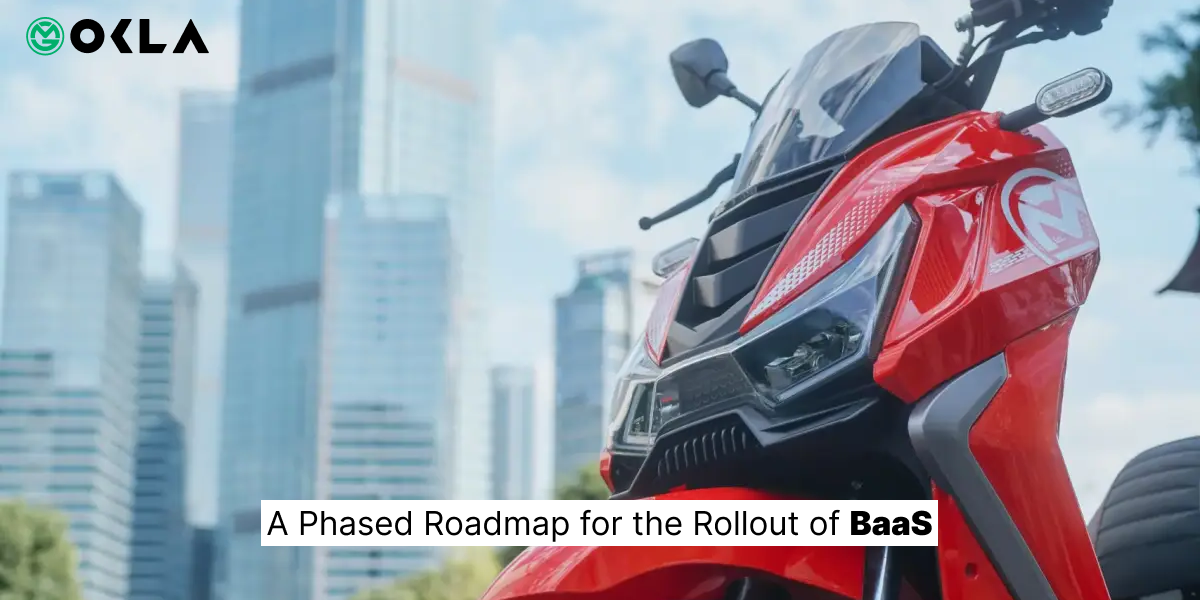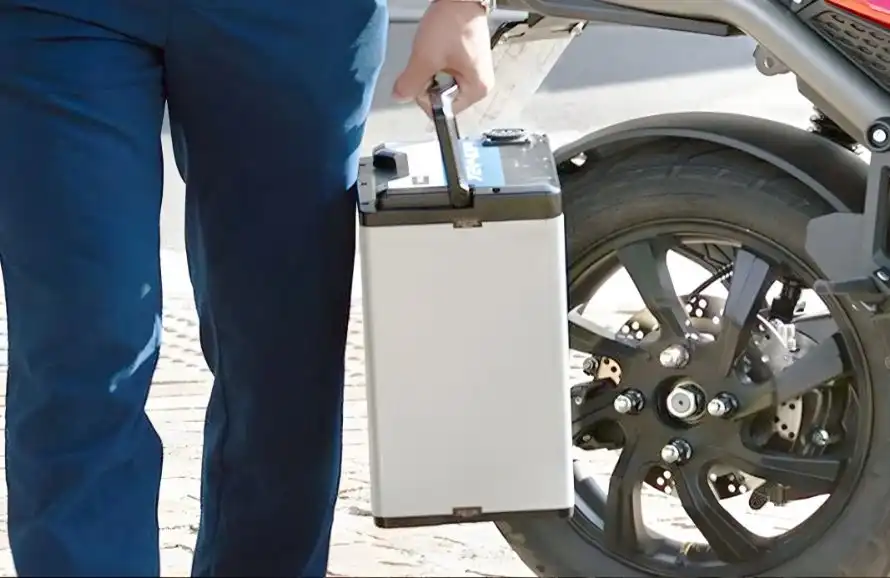Battery-as-a-Service (BaaS), also known as battery as a service Pakistan, changes the battery asset from a fixed cost to an ongoing, managed service. Riders subscribe or pay to swap to access precharged and standardized batteries at swap stations, instead of worrying about slow charging or carrying heavy battery packs with them. There is growing momentum toward a swappable battery model in Pakistan with BaaS as a service model globally, particularly within two-wheeler markets, where cities have relatively dense populations and where speed, reliability, and low capital commitment are paramount.
This article outlines how BaaS works, the business and technical trade-offs, international precedents, Pakistan’s existing battery swap landscape, the potential to lead the rollout in the current battery swap landscape in Pakistan, and how OKLA can lead the deployment in Lahore, Islamabad, Karachi, and beyond.
How Battery-as-a-Service (BaaS) Functions: The Key Elements
Three main elements underpin any viable battery swap station in the Pakistan system:
- Standardized, interchangeable battery packs: Batteries that can easily detach from OKLA vehicles and fit into the swap station battery slots.
- Network of swap stations: Users exchange empty batteries for charged batteries in 1-3 minutes, and the experience is similar to refueling a petrol bike.
- Subscription/pay-per-swap business model: OKLA or a partner owns consumable stock of batteries, battery charging, battery health services, warranty, and recycling at the end of the lifecycle for the batteries.
Key benefits of BaaS
| Key Benefits | Explanations |
|---|---|
| Increased adoption by customers | Reducing the upfront cost of OKLA bikes by disassociating battery ownership increases the number of buyers considering OKLA. |
| Speed of refuelling | Swaps can happen in a matter of just minutes and will attract delivery fleets, ride-hail drivers, and daily nearby urban riders. |
| Control over battery lifecycle & safety | OKLA would centrally monitor battery health, demonstrate safe usage, and manage the reuse/recycle of batteries. |
Challenges and Trade-Offs OF BaaS
| Key Benefits | Explanations |
|---|---|
| Risk of standardization | If OKLA’s form of battery is too dissimilar from existing brands, it will result in interoperability challenges; however, OKLA could lead locally on battery standards or the adapter approach for a standardized solution. |
| High capital investment | Deploying swap stations and maintaining a battery fleet means significant upfront investments. |
| Battery degradation & end-of-life | OKLA (or the swap operator) will need to plan robust systems for warranty management, replacements, and recycling. |
Global Evidence & Lessons
Battery-as-a-Service (BaaS) has awakened from New Zealand to Japan as a transformational model for accelerating EV adoption in different markets around the world, particularly in dense, urban two-wheeler markets like Pakistan.
Taiwan
Gogoro’s success story in Taiwan, for example, has been the most cited. By building a nationwide battery swap network while also getting manufacturers to standardize battery packs across multiple scooter brands, swapping became second nature for riders. The ecosystem created by Gogoro, from battery swap kiosks to retail stores and electric scooter partnerships, shows how ownership of something can become a profitable business model through a service. It allowed users the convenience of “fueling up” in 60 seconds, and Gogoro maintained control of the safety, quality, and recycling of the batteries.
China
The pilots in China with NIO, CATL’s Evogo, and others have shown that utilization of battery swapping can scale when manufacturers, infrastructure, and government all join together. This work has mitigated “range anxiety,” taken advantage of battery utilization, and renewed charging options via the smart grid.
Thus, the important learning for Pakistan and OKLA is that global evidence suggests the EV ecosystem can be successfully pursued in a similar approach if local brands lead and innovate on standardization and battery swapping. With something more practical in mind, these global examples can be used to leapfrog past many known obstacles along the transition to battery swapping for moped rental companies in Pakistan.
Effective Uses for BaaS
- Begin with fleets and delivery services: guaranteed usage that is high frequency enables economic viability in the early stages.
- Minimize the number of battery SKUs (stock keeping units) or implement a single standard: less variability translates to reduced operational costs and greater interoperability among OKLA’s products.
- Utilize renewables and off-peak charging: utilizing solar or other hybrid grid resources with swap stations offers energy cost savings and increases sustainability.
Utilizing these concepts, OKLA can lay the groundwork toward a national plan for the swappable battery model in Pakistan: a departure from the pitfalls of fragmentation or stranded inventory experienced in other markets that led to slower adaptation.
Pakistan’s Landscape: Potential in Pilots, Policy, and Partnerships
Pakistan is already doing some substantive work to incorporate a Battery-as-a-Service model into its electric mobility ecosystem. This has included references to battery swapping in its EV Policy 2025 from NEECA (National Energy Efficiency & Conservation Authority), and they have recognized battery swapping as a key initiative for scaling electrification of two- and three-wheeled vehicles, and favorable tariff charging schemes implemented have improved the cost structure for swap operators.
There is growing investor interest as well. Several startups from Pakistan have initiated their pilot projects for battery swapping pilot projects (clustering around Islamabad), indicating both the customer demand and the willingness of the government to allow battery swapping.
In this emerging industry context, OKLA’s current strengths position it uniquely. With an established array of EV models like OKT, OMIGO, and OMAX, along with an expanding customer base in key metro markets, OKLA already has the trust and the technical foundation to innovate the battery subscription Pakistan segment.
Pilot cities
| Key Benefits | Explanations |
|---|---|
| Risk of standardization | If OKLA’s form of battery is too dissimilar from existing brands, it will result in interoperability challenges; however, OKLA could lead locally on battery standards or the adapter approach for a standardized solution. |
| High capital investment | Deploying swap stations and maintaining a battery fleet means significant upfront investments. |
| Battery degradation & end-of-life | OKLA (or the swap operator) will need to plan robust systems for warranty management, replacements, and recycling. |
Business models and Who Benefits Most
Battery-as-a-Service (BaaS) is most successful in markets with predictable, high-frequency users that assure occupancy and predictable cash flow. The primary beneficiaries are fleet operators, mobility platforms, and OEMs that favor a scalable, service-based business model.
Who benefits most from the BaaS strategy?
Delivery & fleet operators: receive zero downtime and predictable operating costs.
Urban commuters: avoid home charging conundrums, power cuts, and extended charging times.
Possible Business Models for BaaS
| Business Model | Explanation | Best Suited For |
|---|---|---|
| Subscription Plan | Monthly fee for unlimited swaps or a set number of swaps. | Daily commuters, fleet operators. |
| Pay-per-Swap Model | Riders only pay when they swap batteries. | Occasional bikes, low-usage riders. |
| Hybrid Model | Consumers buy one battery but subscribe to an alternate vehicle for backup or long-distance swaps. | Customers who want long-term vehicle value with some flexibility. |
These models will allow companies to move from selling the vehicle to selling mobility solutions while allowing them to unlock better margins and increased engagement over the entire lifecycle of each customer.
Technology and Environmental Issues for BaaS
For large-scale rollouts, standardize batteries across their fleet and potentially across the EV ecosystem in their jurisdiction. The easiest way to do this is to either build or join an open-standard consortium, which can promote interoperability and prevent wasteful duplication.
To ensure the sustainability of the overall credit:
- Renewables: Solar or renewable suppliers to power the swap stations during off-peak hours.
- Battery recycling: Develop either internal or external partnerships to either facilitate battery recycling or second-life uses. There is a growing number of startups in Pakistan focused on recycling, which may provide good partnership opportunities.
- Smart monitoring: Source an IoT-based battery health monitoring system, or utilize proprietary IoT technologies. This will enable predictive maintenance and improve customer perception and peace of mind.
Taken together, these principles will allow you to deliver environmental credibility and operational efficiency, which can be a differentiating characteristic in a very crowded EV marketplace.
Risks and Barriers
The battery swap network Pakistan concept is rich with potential, but it also comes with an inherent risk. These risks can be strategically mitigated as follows:
| Risk | Solution |
|---|---|
| Heavy Capital Costs | Commence operation with small clusters of 20-50 stations, then expand using franchises or PPP models, which will distribute the risk amongst your stakeholders. |
| Fragmented Standards | Drive the national dialogue on establishing a standard form factor to shape policy. |
| Regulatory Delay | Actively engage with NEECA and the Ministry of Climate Change to agree on a swap protocol. |
| Consumer Confidence | Build trust by providing access to real-time dashboards of battery data and transparent warranties. |
Each of these actions not only minimizes business risks but enhances OKLA’s positioning as the trusted EV ecosystem brand in Pakistan.
A Phased Roadmap for the Rollout of BaaS
Phase One – Pilot Projects (Lahore & Islamabad)
Deploy between 20 and 50 stations in areas (DHA, Gulberg, Johar Town, Blue Area). Target OKLA delivery fleets and pilot riders to collect usage data.
Phase Two: Standards & Platform Build
Work with OEMs or independent operators to develop a common battery form factor. Build an invoicing, digital app, and subscription back-end for OKLA Swap+.
Phase Three: Scaling & Green Charging
Scale into Karachi, Faisalabad, and Peshawar using renewables or off-peak energy. Incorporate solar microgrids as an example at swap hubs.
Phase Four: Life Cycle & Re-Cyclability Ecosystem
Work with partnerships to create battery reuse/recycling programs to fulfill the sustainability circle.
Conclusion
At OKLA, we can lead the BaaS shift off the ground in Pakistan by integrating our Battery technology with reliable infrastructure while creating a sustainable solution that leads to mobility while lowering the total cost of ownership for the rider.
For local OEMs like OKLA and other emerging Pakistani brands, working with battery swap operators or co-investing in the rollout of swap stations will be the fastest and most capital-efficient way to scale. Both methods will propel one into the market and create a fitted ecosystem where vehicle sales could leverage recurring after-sales revenue streams fostered by the swap stations, thus creating long-term customers and sustainable financial models in Pakistan’s rapidly evolving electric mobility ecosystem.
FAQ’S
Q1: What is Battery-as-a-Service (BaaS)?
A: BaaS is a model where users pay to access charged batteries instead of owning them, reducing upfront costs and downtime for charging.
Q2: Will Pakistan implement battery swapping?
A: Yes. Pakistan’s EV Policy 2025 supports battery swapping, and OKLA has signed agreements to scale the service nationwide.
Q3: How do battery swap stations work?
A: Swap stations store fully charged batteries. Riders exchange their depleted batteries for charged ones, usually in under three minutes, using OKLA’s verified swapping platform.
Q4: Battery swapping vs. fast charging for e-bikes – which is better?
A: Swapping is fastest and ideal for high-frequency urban riders. Fast charging suits riders who charge at home with reliable power.
Q5: Is battery swapping cheaper than owning a battery in Pakistan?
A: Yes. BaaS removes the high upfront cost of batteries, provides predictable operating costs, and reduces downtime, especially for fleets.
Q6: Where are the swap stations in Pakistan today?
A: Pilot stations exist in Islamabad, with more planned for Lahore and Karachi. OKLA is among the first nationwide operators.
Q7: Who benefits most from BaaS?
A: Fleet operators, delivery services, daily urban commuters, and occasional riders depending on the chosen plan.
Q8: What are the business models for BaaS?
Subscription plan: Unlimited or fixed number of swaps per month.
Pay-per-swap: Pay only when swapping.
Hybrid model: Own a battery but subscribe for backup or long trips.




